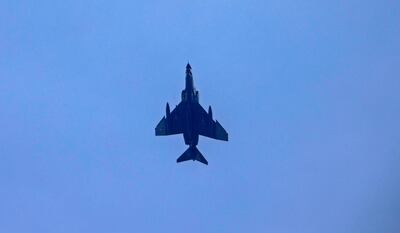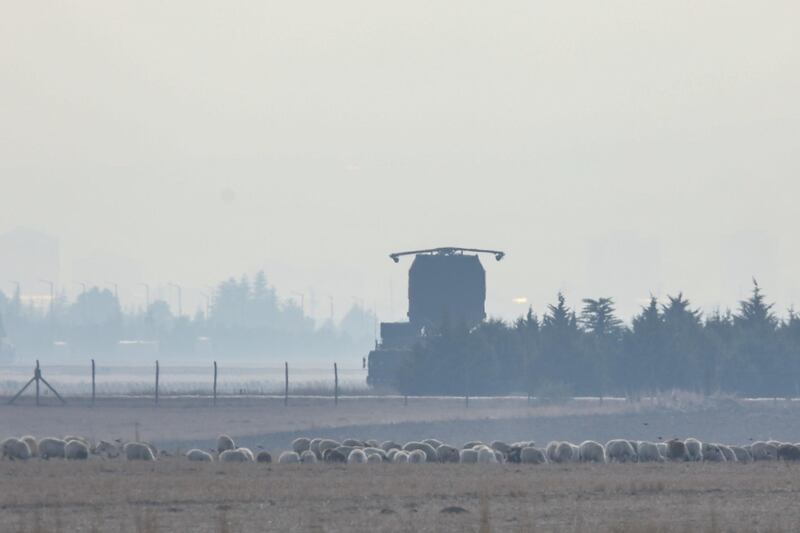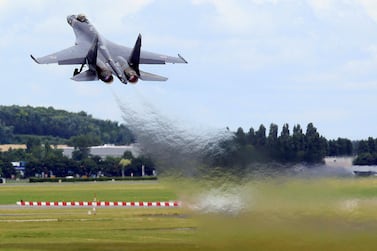Turkey moved a step closer to activating the S-400 Russian missile defence system on Monday as it used American-made F-16 jets to test its radars.
Local Turkish media showed F-16 jets flying over Ankara to test the S-400 system that Turkey acquired over the summer from Russia, despite US and Nato opposition to the deal.
Since then, the US has taken several measures to punish Turkey including cancelling its F-35 warplanes sales and expelling it from the fighter jet consortium it joined in 2002.
F-16 fighter jets and other aircraft belonging to the Turkish air forces are flying over Turkey's capital Ankara in order to test Russian S-400 air and missile defense systems which were delivered between July and September. pic.twitter.com/27wb5R0ajS
— ANews (@anews) November 25, 2019
Privately, Trump administration officials were hoping that Turkey would keep the S-400 system boxed and deactivated to avoid further escalation.
But with Monday’s military exercise, experts agree that Turkey is one step closer to activating the system and is risking more US sanctions.
Aaron Stein, the director of the Middle East programme at the Foreign Policy Research Institute, said Turkey’s behavior had been emboldened by US President Donald Trump.
"Turkey is hiding behind the whims of one man who is not following the law a majority Republican senate passed," Mr Stein told The National.
A US sanctions Act designed to deter any significant transactions with Russia was passed in 2017 with an overwhelming bipartisan majority.
Mr Trump has been delaying the imposition of sanctions on Turkey, a fellow Nato member.
Mr Stein said the US president “is just directing the executive branch to loosely interpret ‘significant transaction’ [with Russia], and hanging his hopes on the rather absurd idea that Ankara won’t use something they paid $2.5 billion [Dh9.18bn] to purchase".
“It is another step towards activation, which Ankara says will be in April 2020,” he said.

Nicholas Danforth, a senior fellow at the German Marshall Fund, said Turkey was “more committed than ever to using the air defence system it purchased.”
"Turkey's solution to this crisis has always been, 'we activate the S-400s and Washington does nothing'," Mr Danforth told The National.
Ankara is now “interpreting Washington’s refusal to follow through on sanctions as an endorsement of this plan", he said.
“What happens when Turkey finally burns through Washington’s remarkable reserves of optimism?”
Congress is growing impatient with Turkey and the White House.
Politicians clashed with Turkish President Recep Tayyip Erdogan during his visit to Washington this month, over his incursion into Syria and closer ties with Russia.
Mr Trump called him a “great president” but the two were not able to reach a compromise on the S-400 purchase.
With Turkey testing the system, the US president could opt for lighter sanctions available through the Act, and Congress could move on other bills to punish Ankara.
Republican Senator Lindsey Graham told Axios on Sunday that he blocked a resolution recognising Armenian genocide by the Ottoman empire on at the request of the White House.
"After the meeting, we kind of huddled up and talked about what happened," Mr Graham said. "The only reason I did it is because he [Erdogan] was still in town.”
Mr Graham he said he would not object to the recognition next time.
The testing of the S-400 in Ankara comes on the eve of a Nato summit planned for next Tuesday in London.
US State Department and Defence officials contacted by The National were not immediately available for comment.






